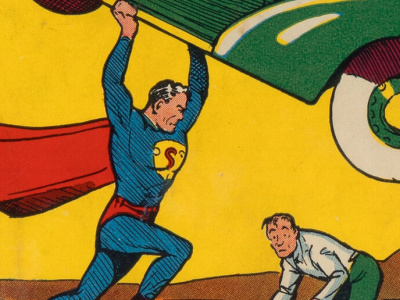Sharpening the Sword is a regular column by retailer John Riley of Grasshopper's Comics, a 1300 square foot comic and game store in
Last week we started looking at customer service concepts and how as the leader in your local market you'll have to live up to the higher expectations of your customers. We were looking at JetBlue and the situation they had with the snowstorm here in
Well, admitting your error is the first step. Most people can accept errors as long as someone owns up to them. Mistakes happen, and people are usually very understanding as long as you admit them. The next step then is to attempt to make up for it, first by fixing it, and then by providing some kind of thank you for your customer's understanding. And of course putting into place policies, procedures and systems to minimize the potential for the same mistake is a good idea. But none of this means anything if you're already overdrawn in your customer's emotional bank account.
If you've read Stephen Covey's book The Seven Habits of Highly Effective People then you've probably been introduced to the concept of an emotional bank account. Basically the emotional bank account is a way of thinking about how much good will you have with your customers. Whenever you live up to or surpass their expectations it's like making a deposit into the account. When they come to your store and have a good experience, they leave feeling just that much better about your store. When they come to your store and have a bad experience, they feel that much worse about your store. When the balance of the account falls into the negatives, you can imagine that they'll leave and won't come back.
Hopefully, you're a store owner that makes plenty of deposits in your customers' emotional bank accounts. Your customers are well served, feel respected, are always greeted warmly, are engaged in fun conversations, and enjoy their hobby while they're in your establishment. You've built up a strong balance in their emotional accounts and they are heavily vested with you. In that case, when a mistake happens and you handle it correctly it's just a small withdrawal and barely makes a dent in the way your customer feels about you and your store. But if you don't make these deposits regularly and often, then even the smallest mistake can cause that balance to shift towards the negative side.
So how's this work in our industry? Here's a few examples:
When Captain America #25 came out I had quite a few customers who came in looking for it and told me that they wouldn't even try one of my competitors as they knew he would pull it off the shelf to price gouge on eBay. Whether he did that or not isn't important, the fact was that he doesn't make those constant deposits, and when the industry hit crisis mode, customers didn't feel good enough about him to even bother trying to go there.
In the world of comics it's generally agreed that DC is the more retailer-friendly publisher. In effect, they've made many more deposits into the emotional bank accounts of retailers than Marvel has (and notably Marvel made one massive withdrawal with the Heroes World disaster years ago). The result is that retailers are generally more forgiving of DC than they are of Marvel. Since Marvel's balance is 'closer to zero' with us, we view their statements with more cynicism and are less understanding of their mistakes.
When WizKids went exclusive with Alliance they had to deal with a lot of retailer backlash. One of the reasons was that their deposits in our emotional accounts (the Clixbrick program, returnability etc...) were big but limited, while their withdrawals were small but many (recurring communication and supply problems, etc.). While their initiatives in our industry have been very beneficial, most retailers still remember the nagging prolonged annoyance of the company's growing pains.
These are just a few examples of this concept in action and how it affects our views in this industry. One of the important things to point out here is that the frequency of the deposits is more important than the size. The sum of all the little things you do for your customers is way bigger than the occasional disaster. And that's the part of customer service we have to always keep in mind, understanding that its all the little things you do that are actually really important.
Prior to opening our store fifteen years ago I shopped at the comic shop that I 'grew up in.' I was a big collector and whenever I went into another shop the owner always tried to get me to join his club. I would tell them that I was already a happy member at another shop and they would tell me that they would beat his discount, give me free bags and boards, etc... But I remained loyal to my shop. Why? Because they always said, 'Hey, Johnny-boy!' whenever I walked in the door and would pull books for me that they thought I might be interested in just to make sure I had the chance to check them out. I felt good about shopping there as all those 'Johnny-boy's' really added up.
And in the case of JetBlue? It all depends on the size of their deposits with their customers. The people who were inconvenienced were inconvenienced in a massive way, so they're going to need to make a huge apology to get their accounts back to a positive standing (and from what I've been told they're not following through with those the way they should be). But the thousands of customers they have who weren't inconvenienced probably still view JetBlue favorably as their personal experience wasn't really affected.
In an age where we increasingly talk about automating things and implementing technology, the concept of an 'emotional bank account' may sound incredibly silly. But it's a great way of thinking about how vested your customers are with your business. And importantly, a great way to remember that making those frequent small deposits is the key to ensuring a strong, long-term relationship that can stand the occasional strain.
More next time.
The opinions expressed in this column are solely those of the writer, and do not necessarily reflect the views of the editorial staff of ICv2.com.







